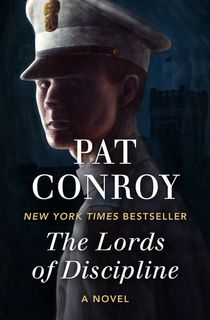Pat Conroy was born in 1945 and mostly raised in Beaufort, South Carolina. But because of his father's job as a Marine fighter pilot, he and his six siblings moved more than twenty times as they grew up. Being a child in a military family is often hard—but it was his father, an abusive man who often referred to himself as "The Great Santini," that made his home life especially difficult. When he grew older, Conroy drew on these experiences to write compelling novels and memoirs, including his first book: The Great Santini. Below, Gloria Steinem reflects on what made Pat Conroy's writing so valuable.
There is nothing more valuable when trying to understand a closed world than hearing from an honest insider; someone who has lived it and is willing to tell the rest of us what it’s like. Of course, it goes without saying that such truth-telling is often punished.
Think of, say, David Brock, a writer inside the rightwing establishment, who attacked Anita Hill with such ferocity that many fence-sitters thought Clarence Thomas must be telling the truth. But when Brock apologized for making false accusations, and revealed the rightwing homophobia that had kept him closeted as a gay man, his former colleagues treated him as even more of an enemy than those who had opposed Thomas’s rise to the Supreme Court all along. Or think of Daniel Ellsberg, the insider who leaked the Pentagon papers, then was attacked longer and harder than those who opposed the Vietnam War from the beginning. Or Edward Snowden, who has been treated as a traitor by some insiders for blowing the whistle on NSA surveillance of allies and enemies alike. I rest my case.
I say this because Pat Conroy has devoted his lifetime of writing to a far deeper, more nuanced, and more devastating critique of the wall-to-wall military culture as it is lived by his and many other military families – and paid the same kind of price. Because novels can show us the subtleties of human behavior in a far more nuanced way than any journalistic expose – and because The Great Santini was Conroy’s first and most autobiographical novel – it stands as a classic account of families whose structure is shaped by the rigid patriarchy around them. And that means a corporate, academic, religious or inherited wealth patriarchy, too.
Related: 10 Must-Read Pat Conroy Books
Conroy himself was the oldest of seven children born to a Marine fighter pilot father, and a mother who married at 18, then excused almost anything her husband did by citing the nature of his job. The family moved 23 times to different military bases. Conroy attended racist Southern schools, then the famous Citadel, the Military College of South Carolina. But he identified with his emotionally abused mother, made friends of the “wrong” race, religion and class, and refused the rewards of following his father into the military. Instead, he spent his lifetime as a teacher and writer, explaining the cost of the culture he knew so well.
This made him a beloved truth-teller to millions of readers. It also caused his books to be disowned by his mother’s family, disavowed as pure fiction by his father, and condemned by The Citadel. Only after years of best-sellers and critical acclaim did that military college invite him back on campus. By then, the Citadel had experienced a real Klan-like racist hazing of its first black cadet; something Conroy’s fictionalized version of Citadel, The Lords of Discipline, had predicted.
A decade later, Conroy arranged for me to speak to a group of student leaders there, including one black male cadet and two of the first four female cadets to be admitted – though only after a law suit, and after the other two had been hazed out. I remember suggesting that the military skills they were being taught might be used as, say, U.N. Peace Keepers – defending against violence rather than initiating it — but I was met with a wall of politeness. As an outsider, I had way less credibility than Pat Conroy.
Related: In His Own Words: 15 Inspiring Quotes by Pat Conroy
Don’t fail to explore any of Conroy’s bestselling novels and memoirs. They are all about the adventure of human relationships, yet The Great Santini is the closest to the bone. We learn what it’s like to grow up with a father who runs his family like a military unit, cannot bear to be defeated by his son at basketball, is casually racist, dreams only of higher rank, and closes down all family arguments by saying, “The Great Santini has spoken.” We see how hierarchy de-humanizes everyone, even at the top.
This novel was made into a movie of the same name – starring Robert Duvall and Blythe Danner – but Conroy’s descriptions convey the subtleties of military friendships based on competition and alcohol, of a boy who learns more from the son of his family’s African American maid than from his own father, and of a wife whose life is governed by her husband’s moods. We also see the possibilities of being a family outsider who is able to identify with outsiders in the larger society, and a mother who conveys humanity to her son simply by loving him.
If hierarchy has put us in any prison, Pat Conroy shows us how courage, empathy and telling the truth can get us out.
Besides, how often is there a male insider who not only sees beyond the patriarchy, but is a gifted novelist besides?
Download The Great Santini and The Lord of Discipline by Pat Conroy.
About the Author
Gloria Steinem is an American feminist, activist, writer, and editor who has shaped debates on gender, politics, and art since the 1960s. Steinem was born in Toledo, Ohio, and was raised by a single mother from her tenth year on. Cofounder of Ms. Magazine and a founding contributor of New York magazine, Steinem has also published numerous bestselling nonfiction titles. Through activism, lectures, constant traveling as an organizer, and appearances in the media over time, Steinem has worked to address institutional inequalities of sex, race, sexuality, class, and access to power in the United States and abroad. She lives in New York City.


